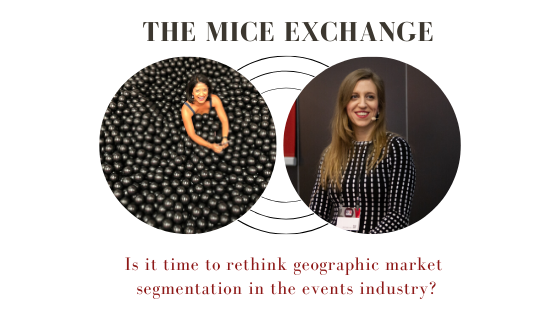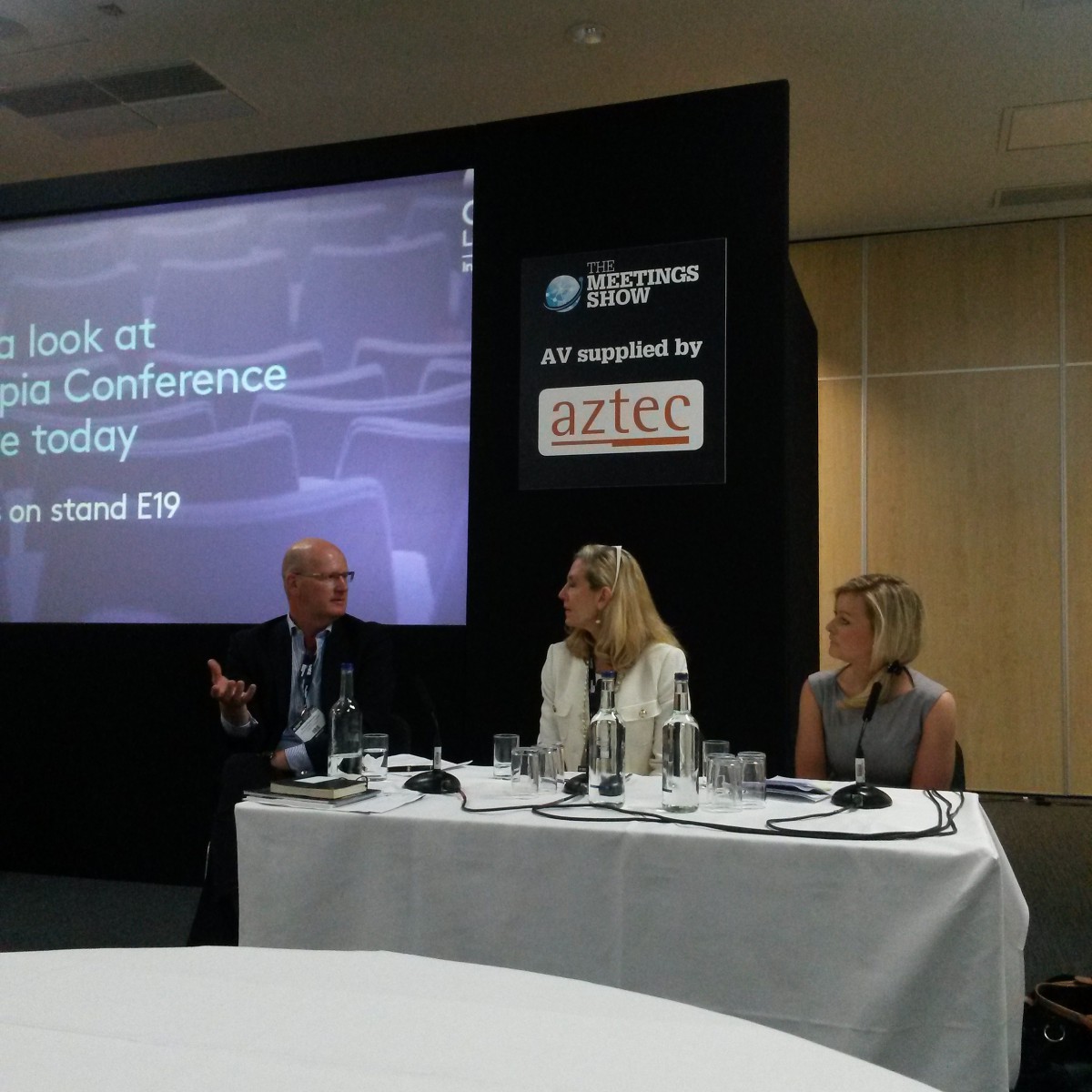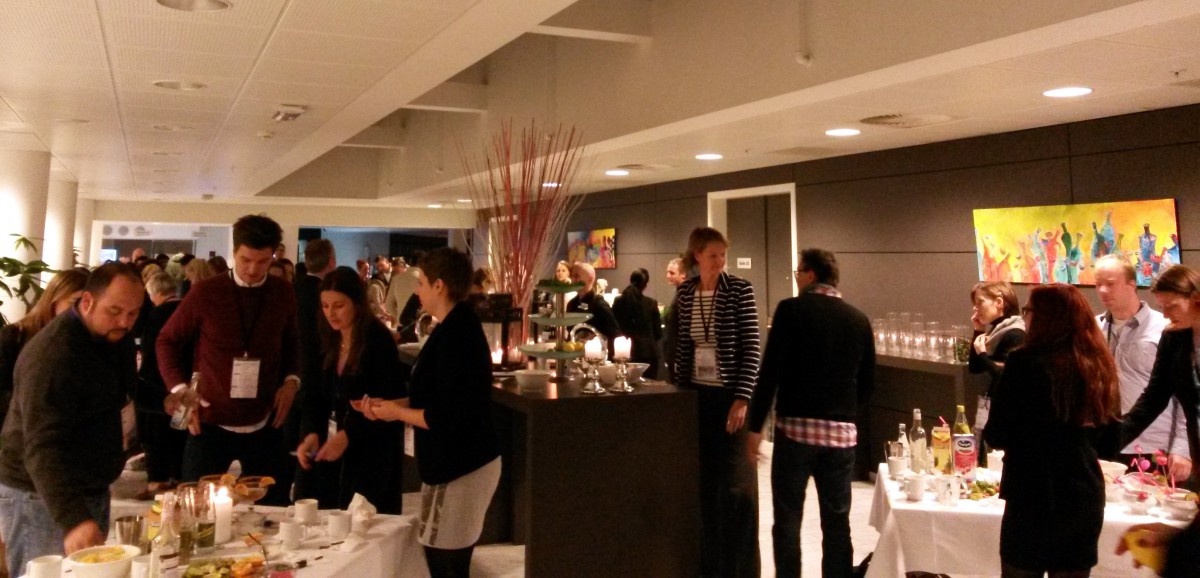The corona crisis has brought the industry together in a way we could have never imagined before. In the current climate, there are no borders and limits to how we can connect and interact with the industry online.
New online initiatives were born out of the crisis, such as the #eventprofstalk hackathon and #EventProfsTogetherAtHome, and this is just the beginning of a shift we’ll see growing in the coming years.
While there’s a shift happening as I write, on a recent MICE Exchange Instagram Live Episode with Sabrina Meyers from Hot Hospitality Exchange (you can follow us on Instagram @themiceblog and @hothospitalitye), we discussed the event industry’s fragmentation caused by geographic market segmentation.
The event industry consists of agencies, corporate events planners, freelancers, associations and so on. On the supplier side, there are DMCs, hotels, sales representation companies, destinations etc., and those are broken down further geographically. From an eagle-eye perspective, it’s usually agency and corporate, and from the supplier side, it’s hotels vs everything else, or alternatively seen as a stand-alone property or a service provider.
How do you define yourself geographically?
Sabrina began her career as an Australian event planner, and after having moved to the UK was a UK event planner. Now, she’s in Germany, and per market segmentation, she’s a German event planner because she resides in that country. Similarly for me, I began in the UK, and now that I’m based in Germany, I’m considered to be a German event planner.
Sabrina shared, ‘Everything I do in terms of content and client correspondence is all in English. That’s where the focus comes in; either, do you want to be the authority and the go-to person in the German-speaking market or, do you want to have a voice that is more global that anyone can understand and follow your content. Because my content is in English, I try to produce it from a global perspective rather than it being market focused.’
When you search for a venue for a client, will you reach out for UK or German representation?
Sabrina commented, ‘I would reach out to my existent contact, who is usually UK based, because I’m still in contact with my UK account managers. Then, my UK account manager will typically say, “I would love to help you, but Germany is not my territory; however, I will connect you with my account manager, who is based in Germany.” Then, I would connect to this person who will, 9 times out of 10, send me an email in German, and I’ll write back saying, ‘I can write to you in really terrible German, or we can communicate in English’; so, we take it from there, and of course everyone mostly speaks English.
Such geographic segmentation depends on the organisation with respect to whether it’s one hotel vs a hotel group. For example, a brand such as Hilton is significantly segmented because they have so many properties and sales teams all over the world, regionally and also on site for every single hotel; so, without segmentation, they wouldn’t be able to cope.
Segmentation is also dependent on the objectives. Do you want to target one specific market, or do you want to go global, and how would you tackle it? The next step depends on the resources a company is able to allocate.
Why is segmentation necessary?
The main reason is the volume of business but also objectives. For a hotel, for example one located in a remote location and that is not necessarily the most accessible property, the most likely target audience is a domestic market; therefore, in this instance, they don’t need to segment. But if it’s a chain hotel in a big city, segmentation is necessary just because of the large volume of requests and workload managing the clients.
According to Sabrina, ‘I don’t focus on one specific market, I’m more comfortable with certain markets—obviously in the UK market and getting more comfortable now in the German market. From an event manger perspective, you can see how these markets work differently.’ The UK market is the biggest, followed by the German market, which is much more fragmented—it doesn’t get together as often as the UK market (for example, most events take place in London vs Berlin, Frankfurt, Munich).
What are the disadvantages of segmentation?
According to Sabrina, ‘Pure segmentation is saying, “she’s a German event planner, she’s a German market”, and as a result, all the opportunities are limited. The activity on the UK market is much bigger. Even though I’m producing content that is relevant to every single market that speaks English, I’m still segmented as the German market. As a result, you’re pigeonholed to that market, and I almost wish that we were pigeonholed to a European market instead of just a German one.’
Also, when it comes to trade shows and industry events, there is still a separation of the markets, and it’s difficult to get out of the group and exchange with everyone. The trade shows typically do the work for their attendees by scheduling appointments, and as a result, attendees don’t have the opportunity to get out of this unless they come alone, as a non-hosted buyer. It’s a mindset and something that trade visitors need to do consciously.
Segmentation at trade shows is a question of return on investment (ROI), where the exhibitors pay to obtain appointments with specific markets, and that is their ROI. If trade shows to become a global appointment market place, exhibitors will be having appointments with event professionals who are from markets that are not their key markets. In that respect, the trade events need segmentation.
Social media vs segmentation
It’s easy to produce segmentation of a trade show, but social media is global, and there’s no segmentation. Both buyers and suppliers have access to everyone and everywhere. Do we still need to take the segmentation approach when we are globally connected on social media?
According to Sabrina (and I agree), no, ‘The beauty of social media is that there’s no segmentation. That’s a shift that began happening 2–3 years ago, with the segmentation lines becoming blurred in the B2B MICE market.’
Hence, on online platforms and in the current climate, event professionals are all experiencing the same issues with respect to running and managing events. That’s why there’s no segmentation but open communication because there are no barriers.
Sabrina has a YouTube show called #EventprofsTogetherAtHome where she interviews global event professionals, ‘It just shows that event planners globally are doing the same and facing the same situation. They might be doing certain things differently, but their feelings, experiences and worries are all the same. It’s the concerns that they have. In that respect, it has been amazing to see globally that event planners are all on the same page, and when it comes to a situation like this, people are connected on the same level.’
Why does regional segmentation limit our knowledge exchange?
According to Sabrina, ‘One phrase that resonates with me in this context is “Jack of all trades, master of none.” I’ve never been a master of one thing. I’m a jack of all trades just because I want to be able to be everywhere and do everything. And I think with regional segmentation, the knowledge exchange is limited because you are unable to exchange with different marketplaces; so, you become restricted. There are probably event professionals that we don’t have access to or don’t know just because of the segmentation. That’s a barrier that prevents knowledge exchange.’
‘During familiarisation trips, knowledge exchange becomes important because you spend several days together and just from a knowledge exchange perspective, the experience can be highly transformative. Familiarisation trips should mix up the market so that participants can learn from each other.’
Is there a way around segmentation for familiarisation trips? Sabrina added, ‘It’s difficult for familiarisation trips because they are organised by the supplier, who are working with the destination partner to organise such trips. It’s got to do with their budget and their ROI. If they invite UK event planners, they must have all the sales representatives from the participating markets. Every region that has buyers on the tips requires representation; otherwise, they can’t network with their clients. There’s a way to do it when none of the sales representatives go on the trip, but purely the clients and the salespeople at the destination; however, I have yet to see this, so perhaps there is an opportunity there—doing global fam trips.’
‘Professionals such as ourselves can provide an example regarding how we can do that by taking the risk, putting yourself out there online, trying to do things and starting collaborations from a global perspective.’
Can you be global?
According to Sabrina, yes. ‘It’s how you choose to start and how you see yourself progressing. Why should we limit ourselves to one market?’
When comparing the MICE trades shows with other industries, such as consumer goods and technology, the industry is relatively small. For example, the Mobile World Congress in 2019 had 109,500 attendees, whereas IMEX Frankfurt 2019 (total participants, including exhibitors) had 14,031. Therefore, in the MICE industry, segmentation can be eased to allow increased knowledge exchange among global visitors.
That’s what the smaller shows are doing, and they will lead the way for the bigger shows now. Shows including Break The ICE Forum, In Voyage and M & I Forums are brining global event planners from different backgrounds together, mixing them, and that is how it needs to be. This way, visitors also connect around a specific interest, such as healthcare or luxury events; connecting around interests vs geographic markets is the way forward.
What are the opportunities when taking a global approach instead of geographic segmentation, and what do you think the future holds?
The future is global. The opportunities are endless if you go global. Everyone is in the same situation, living their lives virtually and connecting with everyone else on a daily basis. This just shows that there’s no segmentation.
People are having webinars, and no one cares where the people are based. Anyone can sign up for a webinar. People are realising this right now, and the event industry is acting together.
According to Sabrina, ‘I haven’t seen so many event professionals create content and go “live” in our lifetime. It’s going to show that we are now embracing it. Once you do so, and suddenly realise how much reach you actually have, you can’t go back. Right now, everyone is having an epiphany about what is happening. It goes to show that people are starting to see this and that we can function and communicate globally; however, it will take a lot more of us embracing that and creating content at a global level to get there. Segmentation has been this way because it will be until someone decides to do it differently and disrupt. Right now, few disruptions are taking place all over—it’s going to take a while until it’s a completely disrupted industry in terms of making it more unsegmented and global; however, as for now, it remains segmented.’
And now a question for you: Do you think that, post coronavirus crisis, the events industry still needs geographic market segmentation?




Thank you very much for sharing a great information. I appreciate your time and effort in your work.
I am glad that you shared this helpful information.
Really a great and informative article.
Really a great and informative article.
Thanks for sharing the wonderful blog post.
Thank you for posting this helpful blog .